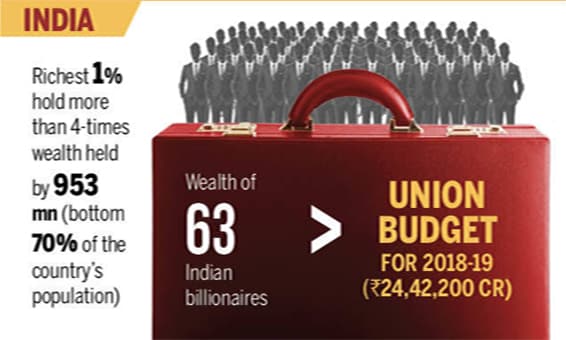On January 20, 2020 rights group Oxfam International released a report titled ‘Time to Care: Unpaid and underpaid care work and the global inequality crisis’. As per the report, India’s richest 1% of the population has more than 4 times of wealth held by 953 million people making up for the bottom 70% of the country’s population. 2,153 of total billionaires globally in 2019 had more wealth than the 4.6 billion people who make up 60% of the planet’s population. The report in detail are as follows: Oxfam Time to Care Report:
Oxfam Time to Care Report:
Report on India:
i.Indian billionaires’ wealth: Total combined wealth of 63 Indian billionaires is higher than the country’s total Union Budget for the fiscal year 2018-19 which stood at Rs 24,42,200 crore.
ii.Unpaid care work of Indian females: Women and girls put in 3.26 billion hours of unpaid care work every day which marks a contribution to the Indian economy of at least Rs 19 lakh crore a year. It is also 20 times the entire education budget of India in 2019 (Rs 93,000 crore).
General report:
i.Report calculation: The report calculations were based on the latest data sources available, that also includes Credit Suisse Research Institute’s Global Wealth Databook 2019 and Forbes’ 2019 Billionaires List.
ii.Global earnings: The no. of billionaires has doubled in over a decade despite decline in their combined wealth. Worldwide men own 50% more wealth than all the women.
iii.Earnings by a female domestic worker: It would take 22,277 years for a female domestic worker to obtain per annum earnings of a top Chief Executive Officer(CEO).
iv.Tech CEO earning: A tech CEO with earnings pegged at Rs 106 per second, would make earnings in a year compared to a domestic worker.
v.Unpaid care work by global females: 11.5% of the global workforce are engaged in paid care work. Women aged 15 and above put in 12.5 billion hours of unpaid care work every day which is equal to the contribution the global economy of at least $10.8 trillion a year. This is more than 3 times the size of the global tech industry.
- It was found in the survey that the 22 of the world’s richest men have more wealth than all the women in Africa.
vi.Tax payments: Only 4% of global tax comes from taxation of wealth. The super-rich people avoid as much as 30% of their tax liability as per the study.
vii.Pressure on global economy: Recently the WEF’s annual Global Risks Report has warned that downward pressure on the global economy and financial inequality will intensify in 2019.
Inequality factors:
i.Climate change: Climate breakdown which is now gaining momentum has been estimated that by 2025, up to 2.4 billion people will be living in areas without enough water, which also indirectly indicates that women and girls will be forced to walk further to find water resources.
Steps proposed to reduce inequality:
i.Inequality will be reduced if the richest 1% pay 0.5% etc wealth tax in the next 10 years. This would generate 117 million jobs in elderly, childcare, education and health sectors.
ii.Job creation: Direct public investments making 2% of GDP (Gross Domestic Product) would potentially create 11 million jobs and will make up for the 11 million jobs lost in 2018.
iii.4R framework: Feminist economists, civil society and care advocates have proposed a 4R framework for radical reprioritization in economies and societies. The 4Rs are recognize, reduce, redistribute and represent
About Oxfam International:
Fact- Oxfam is a confederation of 19 independent charitable organizations focusing on the alleviation of global poverty.
Headquarters- Nairobi, Kenya.
Founded- 1942.
Founder- Cecil Jackson-Cole.
Oxfam India Chief Executive Officer(CEO)- Amitabh Behar.





